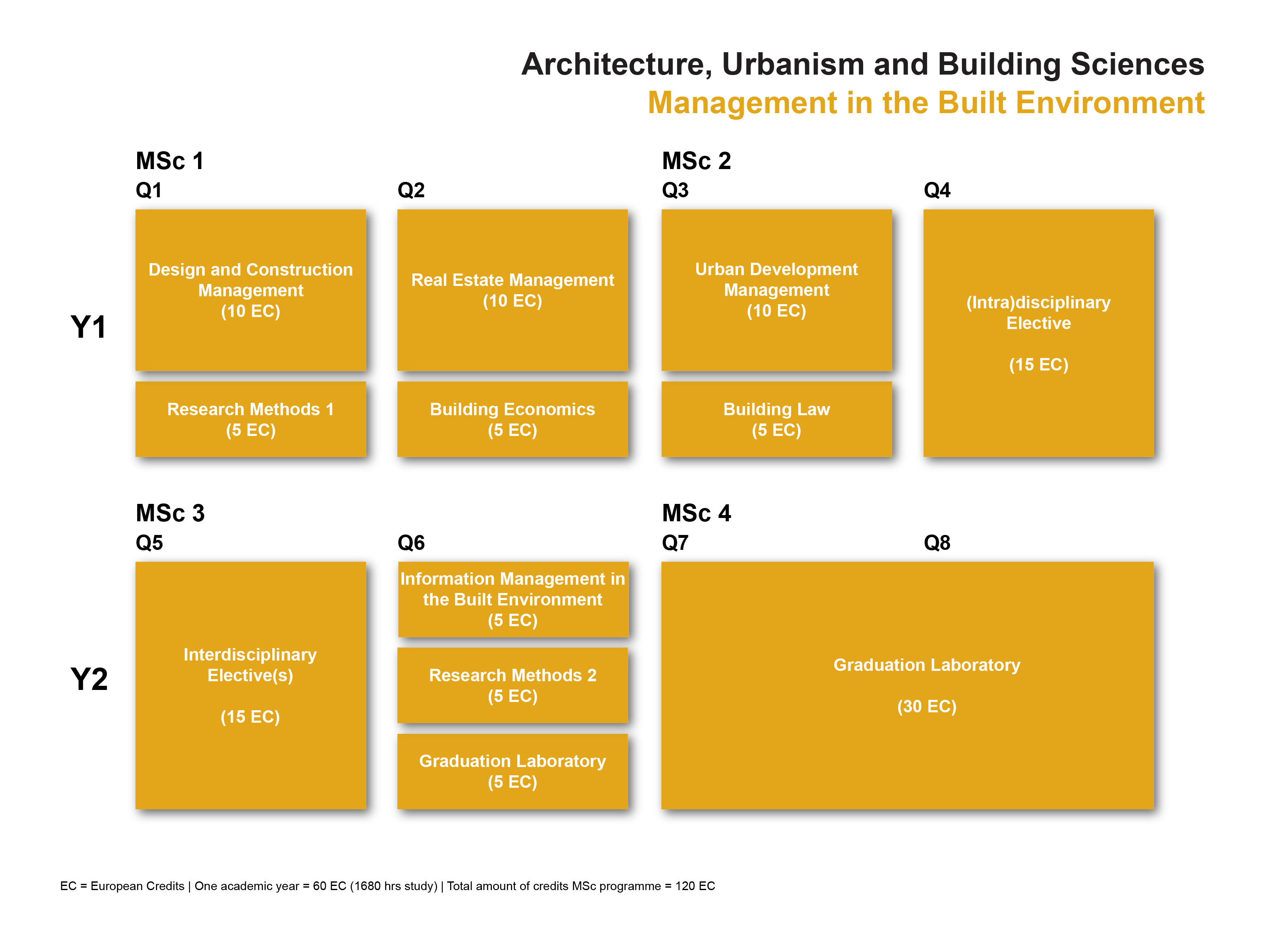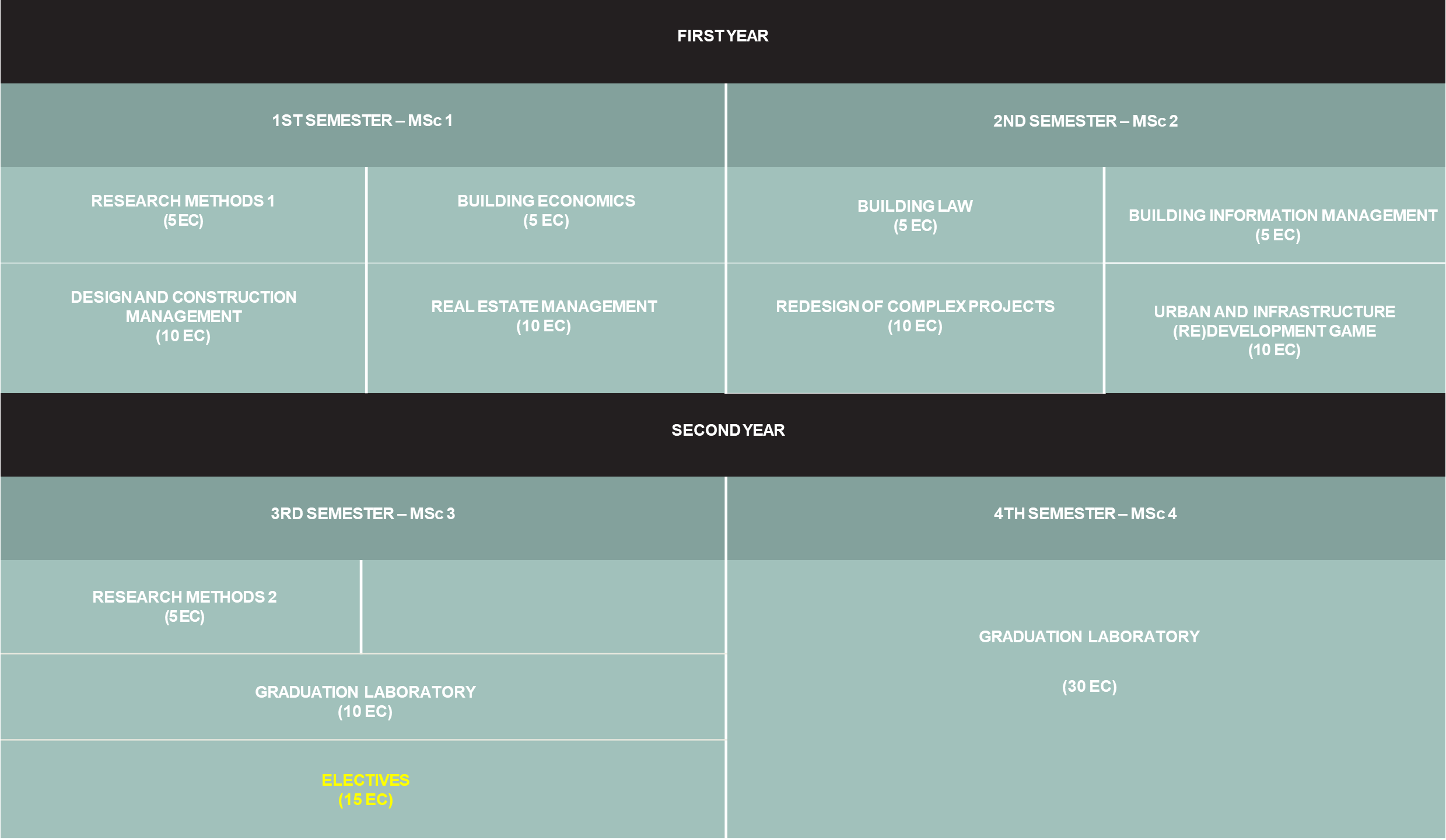Management in the Built Environment
The first year of the Management in the Built Environment track’s programme focuses on the development of core knowledge and skills while the second year focuses on application and synthesis of this knowledge through a graduation project. Students are provided with a coherent overall perspective, giving them a capability to integrate processes, phasing and different scales, while addressing stakeholder concerns.
Freshly started in September 2024?
Did you start freshly this Master track programme in september 2024? Please see your track programme here. More programme information is available on the TU Delft website.
Track programme Management in the Built Environment 2023-2025
Attention! This information is only meant for students who started the Track programme Management in the Built Environment in September 2023 or earlier!
-
In the first year students join the compulsory courses of the track.
From academic year 2024-2025, the following compulsory courses will no longer be offered:
- AR2MBE015 Redesign of Complex Projects
- AR2MBE021 Building Information Management
- AR2MBE025 Urban and Infrastructure (Re)development Game
For replacement courses or extra retake arrangements, please check the Transitional Measures 2024-2025, if you have not completed these courses before 1 September 2024.
Visit the study guide for more information about the courses of year 1.
-
- MSc track Management in the Built Environment requires students to choose 15 EC for electives. Of course, it is allowed to take more than 15 EC for electives.
- If you take more than 15 EC electives, the courses with the highest grades will be included in your exam programme. The other courses will be registered as ‘additional courses’ in your Study Progress Report.
- Students who participate in an exchange programme at a foreign university will likely acquire an equivalent of 30 EC, because an exchange programme will last half a year. The credits can be used as electives.
- The preferable semester to take electives is MSc 3 (first semester of second master year). However, it is allowed to take electives in other periods as well.
- MBE students have total freedom in choosing their electives; there is no obligatory list to choose from. However, the courses (or projects) must be on Master's level (not Bachelor).Electives can be chosen from:
- Compulsory courses (or design projects) or electives from other tracks from the Faculty of Architecture and the Built Environment (Architecture, Urbanism, Landscape Architecture, Building Technology) and MSc Geomatics. Register for courses of the Faculty of Architecture through BIS.For design projects, please check possible entry requirements by checking the study guide or contact the course coordinator (whose name can be found in the study guide).For a full overview of all elective courses from the Faculty of Architecture and the Built Environment please check the study guide and use tab: Program. Then: Organisation (Architecture and the Built Environment); Education Type (Electives); Education (AR Electives).
- Courses or projects from other TU Delft Faculties.In particular courses from the Faculty of Technology, Policy and Management and the Faculty of Civil Engineering and Geosciences are interesting. This applies in particular for courses from MSc Construction Management & Engineering. More information can be found here. However, from the CME program Legal & Governance (AR8003) course cannot be chosen by MBE students because of content overlap.Register for these courses by enrolling through Brightspace. (other faculties do not use BIS).
- Courses form other universities in the Netherlands.You may choose a course from another university if the course fits your graduation topic or interests. For example, you may want to specialise in for example finance at another university.Register for these courses by contacting the course coordinator of the other university. Sometimes, universities do not accept students from other universities.
- Courses from universities abroad.This may be in the framework of an exchange or unrelated to an exchange.More information can be found here. Contact our International Office for registration: internationaloffice-bk@tudelft.nl. In the framework of an exchange, you do not need to pay a fee to the receiving university. Taking a course without an exchange, will likely require you to pay a fee to the receiving university.
- MBE itself offers the following electives:
ARFW1501 Entrepreneurship in the Built Environment (Q4)
ARFW1502 Peri-Urban Transformations: Analysis, Development, Design (Q4)
AR0117 Didactic coaching skills (Q1)
AR0179 Value Capturing (Q2)
AR0185 Research Methods 3 (Q2)
AR0835 Social Sustainability in Human Habitats (Q1)
For these courses, register through BIS.
- Internships do not lead to credits (EC’s)
- The BOSS site (see ‘Education’) holds comments and experiences from students who took electives from Architecture & Built Environment, other TU Delft faculties, other universities in the Netherland and abroad. This site also shows which electives are often taken by MBE students. This may be valuable information for you.
- For inclusion in your Study Progress Report, you need to proof that you completed your electives. Forms need to be handed over to the Board of Examiners for this reason:
- For courses obtained at TU Delft, use form Master Electives list.
- For courses obtained at another university in the Netherlands than TU Delft, use the form Certificate of incorporation.
- For courses obtained at a foreign university (for example in case of an exchange) use form Academic Achievements Abroad. It is advisable in case of courses at foreign universities to ask permission to the Board of
Examiners in advance. This is certainly advisable for countries where there is no bachelor/master structure.
-
MBE offers a number of themes for students to choose from. Each theme will be introduced to students so you can get to know them. The themes are published before the start of the Graduation Lab. Each student chooses a theme during the first week. After that you will suggest a specific research question that falls within the theme. You discuss your research question with the theme coordinator. The start of the Graduation Lab runs parallel with course Research Methods 2. In Research Methods 2 you will make a choice for a method that is congruent with the research question of your graduation thesis.
For the first quarter you will have regular meetings with other students within the theme. After that, you will individually work on your graduation thesis. Most student do a graduate internship with a company, governmental organisation or ngo. The internship is in the last semester.
In the Graduation Manual Master of Science Architecture, Urbanism & Building Sciences important information about the setup of the graduation process and the official regulations that apply to the graduation phase are described.

